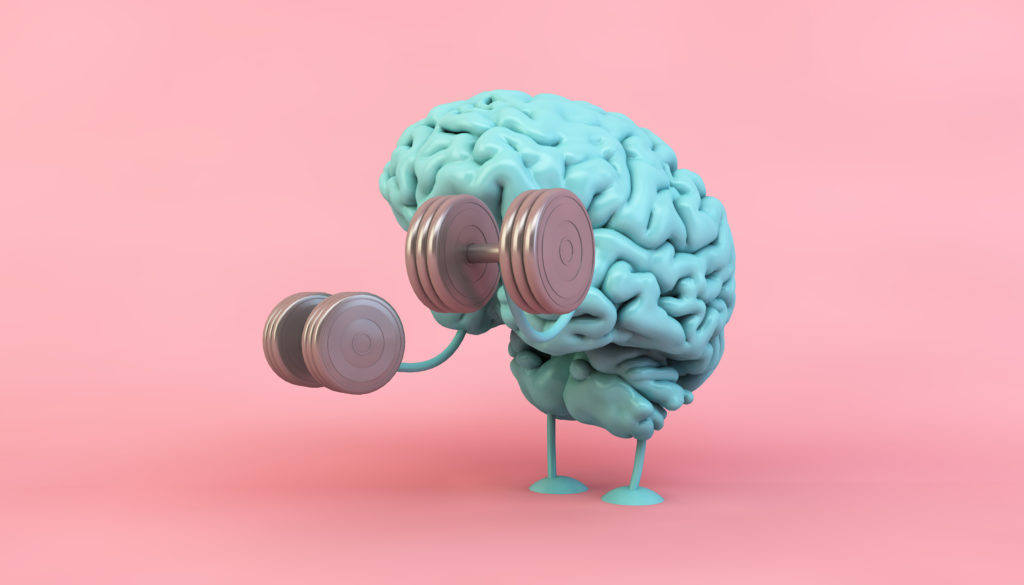Our brains are SO important! They’re our computers, our driving force…they operate our bodies for us. They do things we don’t even have to think about so we can live our lives to the fullest. Just like the rest of our body, taking care of them is essential to live our happiest, most fulfilling lives. Everyone already knows that a good diet and regular activity keep our bodies healthy. While the obvious physical effects of living a sedentary lifestyle are more visible, it’s important to note that physical activity and brain health also go hand in hand. While many neurological disorders affect motor skills and may make heavy aerobic exercise dangerous or difficult, weight exercises and fitness training affect the brain in monumental ways, too. No matter your level of ability, size, weight, or age, the reasons why your brain needs exercise are endless.
Physical Activity and Brain Health – How Exercise Affects Your Brain
In a study done by sports medicine researchers, it was found that regular exercise, most notably aerobic activity, the kind that gets your heart rate up and your sweat flowing, appears to increase hippocampal volume. So what does the hippocampus do? The hippocampus is an important part of the limbic system, the region of the brain that regulates motivation, memory, learning, and emotion. The hippocampus is the first area of the brain to be affected by Alzheimer’s and has links to other dementia disorders. In another more recent study done by scientists and other medical researchers, it was proven that physical activity not only helps slow degenerative pathologies in the brain but it can also delay brain aging.
2019 Game Plan for Your Health – Brain Health: Don’t Just Survive, Thrive!
Directly, physical activity helps the body in a multitude of ways. By staying active we’re keeping the body’s various systems working correctly. Toning muscles, making our cardiovascular system work at full capacity, reducing inflammation, decreasing insulin resistance – these are just a few of the amazing things our bodies heal and help grow when they get proper stimulation and nutrition. Less commonly understood is how physical activity can help us cognitively – by stimulating the brain and eliciting growth and healing neurologically. In a study from early 2019, almost 500 adults gave their brains to science; by allowing researchers to collect data over the course of 20 years and later analyze their brain, researchers learned higher activity was related to a significant decrease in risk for dementia.
How Much Exercise is Enough?
The medical and scientific communities have arrived at common ground when it comes to quantity and quality of physical activity in relation to the brain and other health benefits. To help see the benefits of exercise on the brain, 150 minutes of moderate-intensity aerobic exercise is needed each week. That means with a consistent routine, healthy brain cell growth and the preservation of existing brain cells is yours for the taking. It can also help strengthen the cerebral cortex, improve nerve function, and help with neuroplasticity – the brain’s ability to adapt and create new neural connections.

150 minutes can seem daunting, but it really just means getting out 5 days a week for 30 minutes and making your body move to the best of your ability. You don’t need to go out and buy equipment, join a program or even get a gym membership to meet your 150 minute quota. Here are some great ways to get moving to improve and maintain your brain’s health:
- Take a walk – Just remember to keep your pace brisk and motivated.
- Swimming – Swimming is a great full-body workout! If you have a rec center nearby or know someone with a pool, 30 minutes of moderately paced swimming can be nearly twice as effective as going for a jog.
- Yoga – It may seem surprising, but yoga sessions can be pretty intense! While it focuses on your core strength and fitness, some yoga sessions can make you sweat. Research has found that yoga can be just as effective as aerobic exercise, so don’t mark it off your list!
- Cycling – Even cycling around your neighborhood has benefits. You may not get your heart pumping like you would on a trail, but it gets your body moving and helps with core strength and balance!
- Dancing – This may be more interesting to some, but keep life interesting and turn on some music. 30 minutes of intense dancing can get your heart pumping and keep you nimble.
While we haven’t listed all the benefits exercise has on the human brain here today, we recognize the importance of quality, healthy activity. With advancements in research, backed by fundraising efforts made by organizations like the United Brain Association, researchers can delve even deeper into the impact physical activity has on neurology and brain function. We want you to stay active, and we want your brain as happy and healthy as possible! Want to stay up to date and receive other great information right to your inbox? Sign up for emails today!
You Are Not Alone
For you or a loved one to be diagnosed with a brain or mental health-related illness or disorder is overwhelming, and leads to a quest for support and answers to important questions. UBA has built a safe, caring and compassionate community for you to share your journey, connect with others in similar situations, learn about breakthroughs, and to simply find comfort.

Make a Donation, Make a Difference
We have a close relationship with researchers working on an array of brain and mental health-related issues and disorders. We keep abreast with cutting-edge research projects and fund those with the greatest insight and promise. Please donate generously today; help make a difference for your loved ones, now and in their future.
The United Brain Association – No Mind Left Behind




